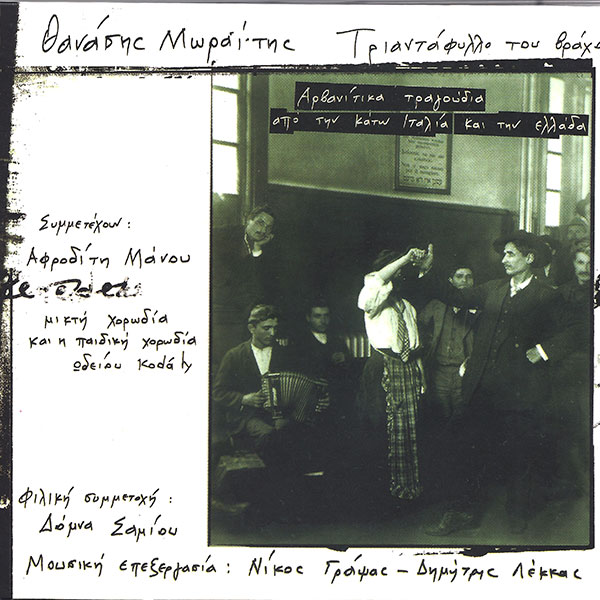00:00
Home / Her Work / Song Catalogue / Here Come Maidens from Psatha
Βίνιεν βάσιαζιτ γκα Ψάθα

Here come maidens from Psatha,
I knew not who they were, I am heart-broken.
Come on, maiden mine,
stand here in the shade.
Here come maidens wave by wave,
all wearing red aprons.
Come on, maiden mine,
stand here in the shade.
On your apron’s flowers,
wish I had been born and died.
Come, maiden, in the night-time,
be a blessing, have me.
I’d have stayed high up on the mountain,
but I missed you terribly.
Come on, maiden mine,
stand here in the shade.
Βίνιεν βάσιαζιτ γκα Ψάθα,
νουκ ι νιόχα ε ντι σα πλιάσα.
Άιντε, βάιζο έα,
πρίρου νε κίο χέα.
Βίνιεν βάσιαζιτ μπουλούκιε,
τερέ’ με ποδέ τε κούκιε.
Άιντε, βάιζο έα,
πρίρου νε κίο χέα.
Ν’ άτα λιούλιετ ε ποδέσε,
τε γιέσιε λιέιτουρ εδέ τε βντέσε
Έα, βάιζο νάτεν,
μίρμε σι ουράτεν.
Πον ντο ρούσεσιε ου γκα μάλι,
πο γκα τυ με μούαρ μάβι.
Άιντε, βάιζο έα,
πρίρου νε κίο χέα.
Απόδοση στα ελληνικά:
Έρχονται τα κορίτσια απ’ την Ψάθα,
δεν τα γνώρισα, έσκασα.
Έλα, κορίτσι μου,
στήσου εδώ στη σκιά.
Έρχονται τα κορίτσια κύματα,
όλα με κόκκινη ποδιά.
Έλα, κορίτσι μου,
στάσου εδώ στη σκιά.
Πάνω στα λουλούδια της ποδιάς σου,
εκεί να ’χα γεννηθεί, εκεί να πέθαινα.
Έλα, κορίτσι μου, τη νύχτα,
σαν ευχή πάρε με.
Δεν θα κατέβαινα απ’ το βουνό,
αλλά σ’ επιθύμησα τόσο πολύ.
Έλα, κορίτσι μου,
στάσου εδώ στη σκιά.
Song from Vilia (Attica). This song was sung about the young women who worked picking cotton in Psatha, near Vilia — an area that used to be marshland, where reeds, rushes, and canes once grew. As they passed through the mountain on their way to work, they were flirted with by the resin collectors.
The rhythm of the song, in its central stanzas, follows the standard strict dactylic hexameter and aligns kinesthetically with the syrtos dance. The faster refrains are composed in a dactylo-anapestic tetrameter. The scale is minor, with the fourth degree occasionally raised, drawn upward by the fifth. The main genus is the hard diatonic, related to the Byzantine nenano mode and the Islamic tetrachord buselik/nahawand, which is drawn toward the Romanian minor — a feature that leads this arrangement into momentary apparent modulations.
Duets are also noted between two closely related wind instruments: the traditional reed flogera (flute) and the recorder.
Recording from the concert featuring unpublished Arvanitic songs from Southern Italy and Greece, held in 1998 at the “Pallas Theatre”. The song is included in the album “Rose of the Rocks, Arvanitika songs from Southern Italy and Greece”, supervised by Thanassis Moraitis (Lyra, 1998).

Singers

Flute

Violin

Santur

Lute

Double bass

Percussion